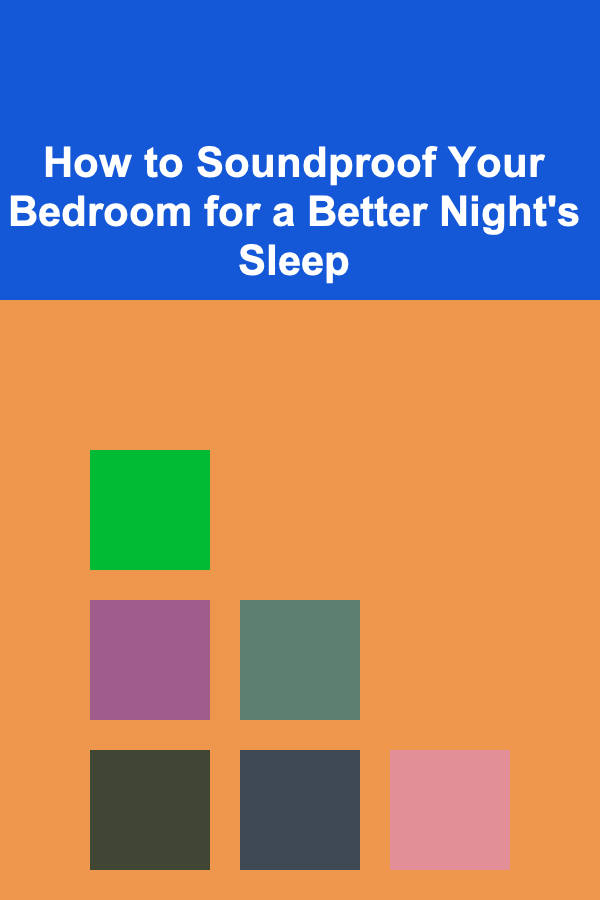
How to Soundproof Your Bedroom for a Better Night's Sleep
ebook include PDF & Audio bundle (Micro Guide)
$12.99$10.99
Limited Time Offer! Order within the next:

In today's fast-paced world, a good night's sleep is more essential than ever. However, for many people, noise pollution can be a significant barrier to achieving restful and uninterrupted sleep. Whether it's the sound of traffic, noisy neighbors, or the hum of electronic devices, excessive noise in the bedroom can disrupt your sleep cycle, leaving you feeling tired, irritable, and unproductive the next day. Soundproofing your bedroom can be an effective solution to creating a more peaceful and restful sleep environment.
In this article, we will explore various methods to soundproof your bedroom, enhancing your sleep quality and overall well-being. From simple and cost-effective DIY solutions to more advanced techniques, you will find practical suggestions to help you reduce unwanted noise and create a quiet haven for sleep.
The Impact of Noise on Sleep
Before we dive into soundproofing solutions, it's important to understand how noise affects your sleep. Noise is one of the primary environmental factors influencing sleep quality. Studies have shown that even relatively low levels of noise can disrupt sleep and have negative effects on physical and mental health.
The Link Between Noise and Sleep Disruption
Sleep disruption caused by noise can lead to fragmented sleep cycles, which reduce the quality of rest you get during the night. This can cause you to wake up feeling tired and groggy, despite spending a full eight hours in bed. Over time, chronic sleep deprivation due to noise pollution can result in:
- Cognitive Impairment: Lack of sleep can impair memory, attention, and decision-making abilities.
- Mood Disorders: Disrupted sleep is linked to mood disorders such as depression and anxiety.
- Health Problems: Chronic sleep deprivation can increase the risk of developing cardiovascular diseases, obesity, and weakened immune function.
For many people, reducing noise in the bedroom is not just about comfort; it's essential for maintaining both physical and mental health. Fortunately, soundproofing your bedroom can provide a viable solution to this problem.
Identifying Sources of Noise in Your Bedroom
Before you begin soundproofing, it's important to identify where the noise is coming from. The source of noise will dictate which soundproofing techniques you should use. Common sources of bedroom noise include:
External Noise
- Traffic noise: Car engines, motorcycles, buses, and trains passing by can generate disruptive sounds.
- Neighborhood noise: Noisy neighbors, loud parties, children playing, or even pets barking can contribute to unwanted noise.
- Airplane or train noise: People who live near airports or train stations are often exposed to consistent noise that can be difficult to block.
Internal Noise
- Noise from household appliances: Items such as air conditioners, refrigerators, fans, and heating units can produce constant background noise.
- Electronic devices: Television, computers, smartphones, and other electronics can emit sounds that disrupt sleep, even when they are on standby.
- Footsteps and creaky floors: In homes with thin walls, floors, or ceilings, footsteps or furniture movement can be a major source of internal noise.
Once you've identified the sources of noise, you can determine which soundproofing techniques will work best for your specific needs.
Soundproofing Techniques to Consider
There are several strategies you can use to reduce the noise that infiltrates your bedroom. Some solutions are easy to implement, while others may require professional assistance. Here are the most effective soundproofing techniques:
1. Install Soundproof Curtains
One of the simplest and most cost-effective ways to reduce noise in your bedroom is by installing heavy, soundproof curtains. These curtains are made from thick, dense materials that absorb sound and prevent it from entering the room. Soundproof curtains are particularly effective at blocking out external noises such as traffic, sirens, and other environmental sounds.
- Choose thick fabrics: Look for curtains made from materials such as velvet, heavy polyester, or specially designed acoustic fabrics.
- Layering: For better soundproofing, consider layering soundproof curtains with regular blackout curtains.
- Proper Installation: Ensure that the curtains cover the entire window and reach the floor to maximize their soundproofing effectiveness. Installing a curtain rod that extends beyond the window frame can help prevent sound from leaking through the sides.
While soundproof curtains won't eliminate all noise, they can significantly reduce the amount of external sound that reaches your ears, making them an excellent addition to any bedroom.
2. Use Acoustic Panels or Foam
Acoustic panels are specially designed to absorb sound waves and reduce noise. These panels are commonly used in recording studios and theaters, but they can also be applied in the bedroom to minimize the impact of internal noise. Acoustic foam panels are typically made from sound-absorbing materials like polyurethane, which dampens sound vibrations.
- Placement: To achieve optimal soundproofing, place acoustic panels on walls that are exposed to external noise sources or those that are adjacent to noisy rooms (e.g., living rooms or hallways).
- Panel Design: Acoustic panels come in various designs, including flat, wedge-shaped, and pyramid foam panels. The shape and design of the panel will determine how well it absorbs sound.
- Aesthetic Considerations: If you're concerned about the appearance of acoustic foam panels, you can choose decorative fabric-covered panels that blend in with the room's décor.
Using acoustic panels can drastically improve sound insulation in your bedroom by absorbing high-frequency noise, such as voices, electronics, and appliance sounds.
3. Add Mass to the Walls
One of the most effective ways to soundproof a room is by adding mass to the walls. Sound travels through the air, but it also travels through solid surfaces like walls, ceilings, and floors. Adding mass to these surfaces helps block sound from passing through.
- Use Mass Loaded Vinyl (MLV): MLV is a dense, flexible material that can be installed over existing walls or under drywall. It is designed to block sound transmission and is often used in construction for soundproofing purposes.
- Double Drywall Layer: Another method is to install an additional layer of drywall on top of your existing walls. For better results, you can add a layer of Green Glue between the drywall sheets, which is a noise-dampening compound that reduces sound transmission.
While adding mass to the walls requires more effort and expense, it is one of the most reliable ways to reduce both airborne and impact noise.
4. Seal Gaps and Cracks
Even small gaps or cracks in your walls, doors, windows, or flooring can let sound enter your bedroom. Sealing these gaps can significantly improve your room's soundproofing performance.
- Weatherstripping for Doors and Windows: Apply weatherstripping tape around the edges of doors and windows to create a tight seal that prevents sound from leaking in.
- Caulking: Use acoustic caulk to fill in cracks or gaps in walls, baseboards, and ceilings. Acoustic caulk is designed to stay flexible and prevent sound from passing through.
- Door Sweeps: Install door sweeps at the bottom of doors to block sound from entering through gaps under the door.
This is one of the most affordable and effective ways to improve soundproofing without requiring major renovations.
5. Use Soundproof Rugs and Carpets
Another simple way to reduce noise, particularly impact noise such as footsteps or furniture movement, is by using soundproof rugs or carpets. Rugs and carpets can absorb sound vibrations and reduce the overall noise level in the room.
- Choose Thick, Dense Rugs: The thicker and denser the rug, the better it will absorb sound. Consider using a high-pile rug or a carpet with a dense backing to maximize sound absorption.
- Carpet Padding: For additional soundproofing, use a thick, high-density carpet pad underneath your rug or carpet. This will help to further reduce the transmission of noise, particularly if your bedroom is located above another room or apartment.
Soundproof rugs can be particularly effective at reducing impact noise and footstep sounds, making them ideal for shared living spaces or multi-level homes.
6. Consider Soundproofing Your Ceiling and Floor
If you're dealing with noise coming from above or below your bedroom, it may be necessary to address your ceiling and floor as well. In apartment buildings or multi-level homes, sound can travel easily between floors.
- Ceiling Soundproofing: Consider adding a layer of soundproofing material to your ceiling, such as acoustic foam or MLV. In more severe cases, you may need to install resilient channels and additional layers of drywall to create a soundproof barrier.
- Floor Soundproofing: If noise from below is an issue, consider installing soundproof flooring options, such as cork or rubber underlayment. You can also add a thick carpet or rug to dampen sound coming from the floor below.
These methods are more involved and may require professional installation, but they can greatly reduce noise transmission between floors.
7. Invest in White Noise Machines
If complete soundproofing isn't possible or practical for your bedroom, consider using a white noise machine to mask disruptive sounds. White noise machines generate a constant, soothing sound that can help drown out external noise, making it less noticeable and less likely to disturb your sleep.
- White Noise Generators: These devices produce a consistent, non-distracting sound that can cover up noise from traffic, neighbors, or appliances.
- Sound Apps: Many smartphone apps and devices offer a range of soothing sounds, including white noise, rain, ocean waves, and more, to help create a peaceful sleeping environment.
White noise machines are an affordable and effective option for people who can't completely soundproof their bedrooms but still want to improve their sleep quality.
Conclusion
Soundproofing your bedroom is one of the most effective ways to improve the quality of your sleep and create a more peaceful and restful environment. Whether you choose to install heavy curtains, use acoustic panels, add mass to your walls, or seal gaps and cracks, each method can contribute to reducing noise and improving your sleep experience.
By combining these techniques, you can significantly reduce the impact of both external and internal noise, ensuring that you get the restful sleep you need for a healthier, more productive life. No matter the source of noise, with the right approach, you can transform your bedroom into a quiet sanctuary for relaxation and sleep.

Beginner's Guide to Personal Productivity
Read More
How To Achieve a Dewy Skin Finish
Read More
How to Create a Cozy Holiday Vibe with Lighting and Fabrics
Read More
How to Cut Unnecessary Subscriptions from Your Budget
Read More
How to Reduce Home-Related Expenses During the Holiday Season
Read More
How to Use Technology to Enhance Your Home Staging
Read MoreOther Products

Beginner's Guide to Personal Productivity
Read More
How To Achieve a Dewy Skin Finish
Read More
How to Create a Cozy Holiday Vibe with Lighting and Fabrics
Read More
How to Cut Unnecessary Subscriptions from Your Budget
Read More
How to Reduce Home-Related Expenses During the Holiday Season
Read More